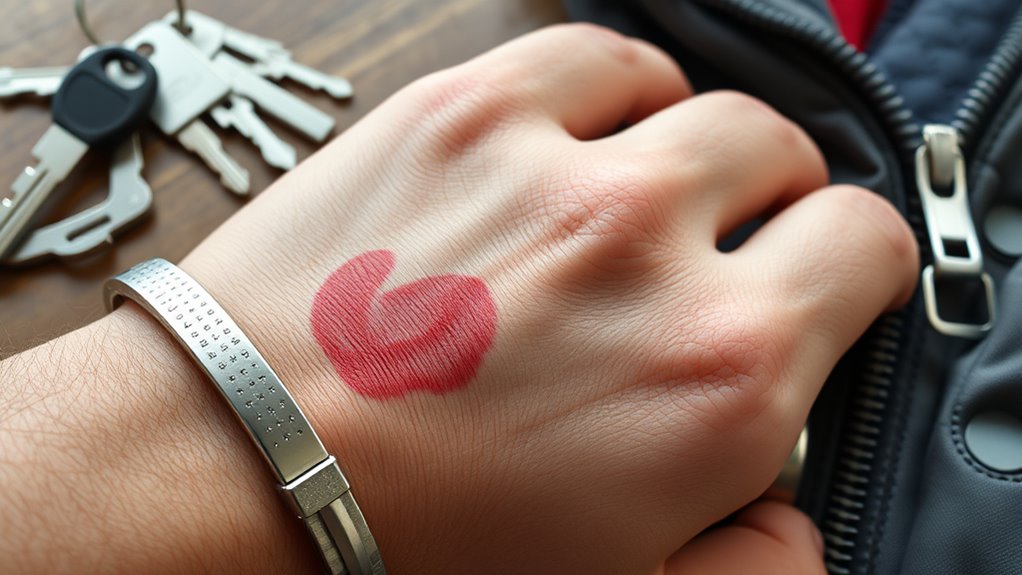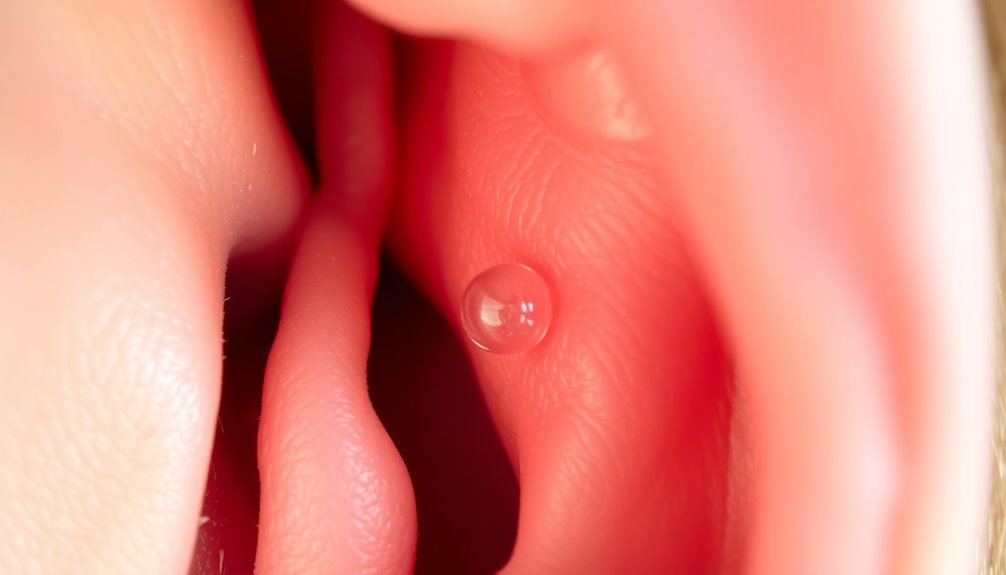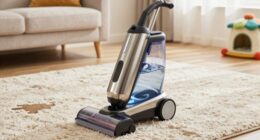If you have a nickel allergy, you should watch out for everyday items like jewelry, clothing fasteners, household cookware, and electronics that may contain nickel. Nickel can cause skin irritation from items like earrings, zippers, buttons, or even your smartphone. Using nickel-free or hypoallergenic products and protective barriers can help prevent reactions. To find out more about how common items might affect your allergy and ways to reduce exposure, stay tuned for helpful tips and advice.
Key Takeaways
- Nickel-containing jewelry, accessories, and clothing fasteners can trigger allergic skin reactions.
- Household items like cookware, utensils, and metal fixtures often contain nickel and may cause dermatitis.
- Electronics such as smartphones and gadgets frequently include nickel in their components, posing allergy risks.
- Personal care products and workplace tools may have trace nickel residues or nickel-plated parts that irritate skin.
- Using nickel-free, hypoallergenic alternatives and protective barriers can significantly reduce exposure and allergy symptoms.
Common Jewelry and Accessories
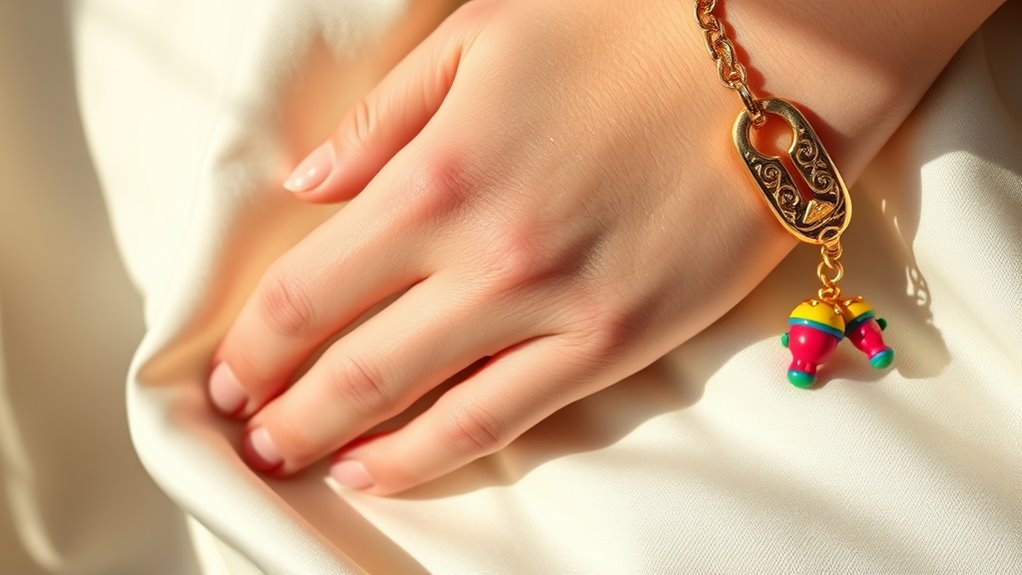
Many common jewelry items and accessories contain nickel, which can trigger allergic reactions in sensitive individuals. When you wear earrings, rings, bracelets, or watches with nickel, your skin may become red, itchy, or inflamed. Nickel often appears in inexpensive jewelry because it’s a cheap metal that enhances durability and shine. If you’re allergic, even brief contact can cause discomfort. You might notice symptoms after wearing jewelry for a short time or after prolonged exposure. To protect yourself, look for jewelry labeled “nickel-free” or made from hypoallergenic materials like stainless steel, titanium, or gold. Removing jewelry at the first sign of irritation can help prevent worsening reactions. Being aware of nickel content in your accessories is the key to avoiding allergic flare-ups. Additionally, advances in metal processing technologies are making it easier to find high-quality, nickel-free options on the market.
Household Items and Kitchenware

Many household items and kitchenware contain nickel, which can trigger allergic reactions. Items like cookware, utensils, and cleaning tools often have nickel alloys, so it’s important to check their labels. Being aware of these materials helps you avoid unnecessary skin irritation in your daily routines. Additionally, selecting nickel-free alternatives can further reduce the risk of allergic responses.
Nickel in Cookware
Nickel is a common component in various types of cookware, especially stainless steel pots and pans, which are popular for their durability and resistance to corrosion. If you have a nickel allergy, using these items might trigger skin reactions, especially if the cookware is damaged or worn. Acidic foods, like tomatoes or citrus, can cause nickel to leach more easily into your dishes. To minimize exposure, consider opting for cookware made from alternative materials such as cast iron, glass, or ceramic. You can also look for nickel-free stainless steel or apply a protective coating to your existing cookware. Regularly inspecting your pots and pans for scratches or damage helps prevent increased nickel release and reduces allergy symptoms. Additionally, positive thinking techniques can help you manage the stress associated with allergy management and lifestyle adjustments.
Jewelry and Accessories
Because nickel is a common component in household items and jewelry, wearing or handling these objects can trigger allergic reactions in sensitive individuals. You might notice redness, itching, or swelling after contact. Jewelry such as earrings, necklaces, and rings often contain nickel, especially if they’re inexpensive or unlabeled. Accessories like watches, belt buckles, and glasses frames can also cause irritation. To avoid reactions, choose nickel-free options or items made from hypoallergenic materials. Be cautious with:
- Costume jewelry and fashion accessories
- Metal clasps on handbags or clothing
- Decorative pins or brooches
Being aware of what you wear and handle helps prevent uncomfortable skin reactions. Always check labels or opt for jewelry marked “nickel-free” to keep your skin safe. Recognizing paint sprayer technology can also help in choosing safer, more efficient tools for your projects.
Household Cleaning Items
Household cleaning items and kitchenware often contain nickel as a hidden component, especially in metal parts or decorative finishes. When you use items like stainless steel sinks, pots, pans, or cleaning tools, nickel can be present beneath the surface. If you have a nickel allergy, touching or handling these objects might trigger skin reactions. Even cleaning products that contain metallic abrasives or corrosion-resistant coatings could expose you to nickel particles. Be cautious with items labeled as stainless steel or nickel-plated, and consider switching to nickel-free alternatives. Wearing gloves while cleaning or handling metal kitchenware can help reduce contact. Always check product labels and opt for hypoallergenic options to minimize your risk of allergy flare-ups during routine household chores. Additionally, hackathons have shown that virtual environments can foster innovative solutions for allergy management, such as developing new hypoallergenic materials or safer cleaning products.
Clothing and Fasteners
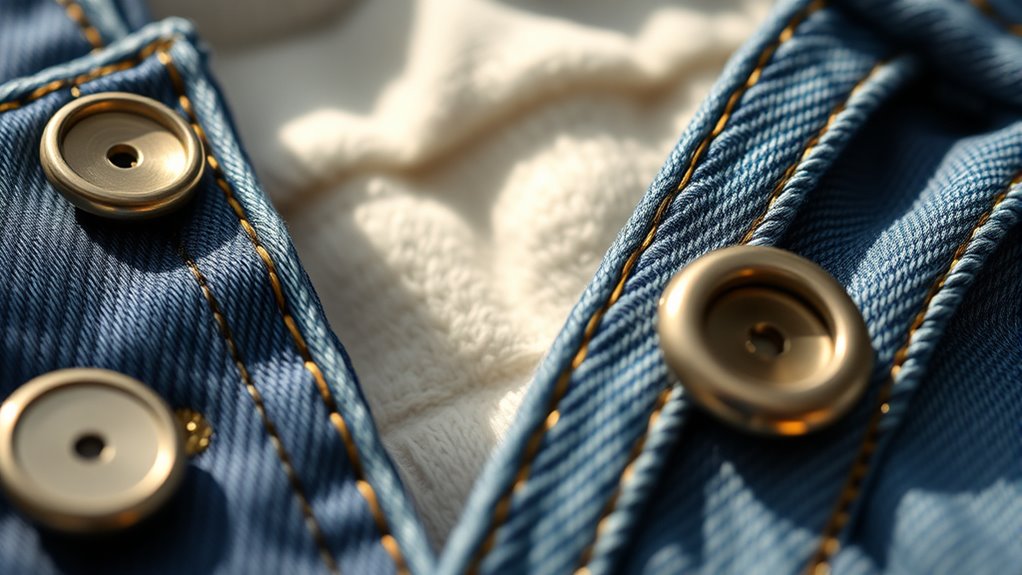
Many clothing items and fasteners contain nickel, which can trigger allergic reactions in sensitive individuals. You might not realize how common nickel is in everyday apparel, from zippers to buttons and belt buckles. When your skin contacts these metal parts, it can cause itching, redness, or even rashes. To reduce exposure, consider choosing hypoallergenic alternatives or coated fasteners.
Nickel in clothing can cause allergic reactions like rashes and redness.
Here are some common items to watch out for:
- Metal buttons and snaps on jeans and shirts
- Zippers on jackets and trousers
- Belt buckles and metal clasps
Being aware of these items helps you avoid unnecessary flare-ups. Opting for nickel-free clothing or using protective barriers can make a significant difference in managing your allergy.
Electronics and Gadgets
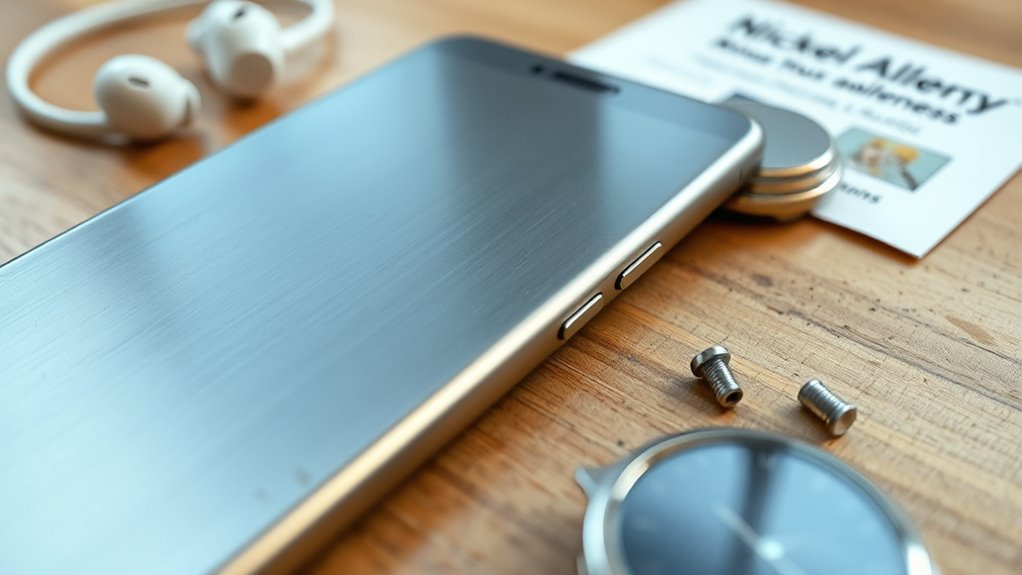
Many electronics, like smartphones and wearable devices, contain nickel in their components, which can cause reactions if you’re sensitive. You should be aware of how nickel might be present and take steps to minimize exposure. Proper care tips can help you enjoy your gadgets without worsening your allergy. Being aware of nickel content in electronics can further help you make informed choices and reduce the risk of allergic reactions.
Nickel in Smartphone Components
Smartphones often contain nickel in various components, making everyday use a potential source of allergic reactions for sensitive individuals. You might unknowingly come into contact with nickel through parts like the casing, connectors, or internal circuitry. Nickel’s durability and corrosion resistance make it a popular choice for phone manufacturing, but it can trigger skin reactions if you’re allergic. Being aware of where nickel hides helps you manage exposure better. For example, personal finance management strategies such as choosing devices with nickel-free options or protective cases can help reduce contact.
Wearable Devices and Nickel
Wearable devices and gadgets often contain nickel in their electronic components, making them a common source of allergy for sensitive individuals. When you wear smartwatches, fitness trackers, or wireless earbuds, nickel can come into direct contact with your skin, especially if the device’s casing or internal parts are uncoated. Prolonged exposure can lead to skin irritation, redness, and rash. Even if you’re careful, tiny amounts of nickel may leach out over time or during sweating, increasing your risk. Some devices are designed with nickel-free materials, but many still contain it to reduce costs or improve durability. If you have a nickel allergy, you should check product specifications and consider protective covers or coatings to minimize skin contact. Additionally, understanding different headphone types can help you choose options that reduce skin exposure.
Care Tips for Electronics
To keep your electronics in good shape and reduce the risk of skin irritation, proper care and maintenance are key. Regularly clean your devices with a soft, damp cloth to remove dirt and sweat that can cause skin reactions. Avoid harsh chemicals or abrasive materials that might damage surfaces or expose you to allergens. Use protective cases or covers to prevent direct contact between your skin and metal parts, especially if you have a nickel allergy. Keep devices dry and store them in a cool, dry place when not in use, as moisture can promote corrosion and allergen buildup. Incorporating ergonomic practices can also help prevent discomfort during prolonged use.
Personal Care Products

Have you ever considered that your everyday personal care products might be a source of nickel exposure? Many cosmetics, skincare items, and even hair products contain trace amounts of nickel as a contaminant or additive. Items like lip gloss, foundation, or facial creams may have nickel residues, especially if they contain metal-based pigments or colorants. Nail polishes and eyebrow pencils sometimes include nickel compounds, which can cause skin reactions. Additionally, some moisturizers and sunscreens may have hidden nickel sources. When you apply these products regularly, nickel can accumulate on your skin and lead to allergic reactions over time. To reduce exposure, look for nickel-free labels, choose natural or hypoallergenic products, and always read ingredient lists carefully. Awareness of nickel content in products can help you make more informed choices to protect your skin.
Workplace Materials and Equipment

Many workplace materials and equipment can be sources of nickel exposure, especially if you handle metal objects or use tools with nickel-plated parts regularly. You might unknowingly come into contact with nickel through everyday tasks. For example, handling certain tools or equipment can cause skin irritation if you’re allergic. Be aware of materials that are commonly nickel-laden.
- Metal fasteners and screws in machinery
- Nickel-plated hand tools and equipment
- Metal desk accessories or fixtures
If you notice skin reactions after handling these items, it might be due to nickel exposure. Using protective gloves or requesting nickel-free alternatives can help reduce your risk. Staying vigilant about your work environment is key to managing nickel allergy symptoms effectively.
Tips for Reducing Nickel Exposure

Taking proactive steps can considerably minimize your exposure to nickel in everyday life. Start by choosing jewelry labeled nickel-free or made from hypoallergenic materials like surgical steel, titanium, or plastic. Before wearing new items, wash them thoroughly to remove surface nickel residues. Be cautious with everyday objects such as keys, watches, and eyeglass frames—they often contain nickel. Use protective barriers like clear nail polish or adhesive bandages on items that contact your skin frequently. Keep your skin dry and clean, as moisture can increase nickel absorption. Regularly clean items that may harbor nickel dust, such as kitchen utensils or coins. By being mindful of the products you use and taking these simple precautions, you can significantly reduce your risk of allergic reactions.
Frequently Asked Questions
Can Nickel Allergy Develop at Any Age?
Yes, nickel allergy can develop at any age. You might not notice symptoms initially, but exposure over time can trigger an allergic reaction. Whether you’re young or older, your immune system can become sensitive to nickel, especially if you frequently wear jewelry, use certain household items, or work with metals. It’s important to stay aware of symptoms like skin rash or itching, regardless of your age.
Are There Natural Remedies for Nickel Allergy Relief?
You’re wondering if natural remedies can help with nickel allergy relief. While there’s no cure, some people find relief using natural options like applying aloe vera or coconut oil to soothe irritated skin. You might also try soaking in colloidal oatmeal baths to reduce inflammation. Remember, natural remedies can help manage symptoms, but it’s best to consult a healthcare professional for personalized advice and to avoid potential allergic reactions.
How Long Does a Nickel Allergy Skin Reaction Last?
Your skin reaction from a nickel allergy can last anywhere from a few days to a couple of weeks, depending on how quickly you treat it. If you avoid nickel and use soothing remedies like corticosteroid creams, you may see improvement within a few days. However, if you continue contact or don’t treat it properly, the reaction could persist longer. Always monitor your skin and seek medical advice if needed.
Can Nickel Allergy Cause Systemic Health Issues?
Imagine your body’s immune system as a vigilant guard dog. When nickel triggers it, you might notice skin rashes, but sometimes, it’s like the dog barking at shadows—causing confusion. While nickel allergy mainly affects your skin, in rare cases, it can lead to systemic issues like fatigue or joint pain. Staying aware helps you prevent these reactions and protect your overall health.
Is Nickel Allergy Hereditary or Genetic?
You might wonder if nickel allergy runs in families. While it’s not directly inherited, your genetic makeup can influence how your immune system reacts to nickel. If a close family member has a nickel allergy, you’re more likely to develop one too. Your genes can make you more susceptible, but environmental factors and exposure also play vital roles in triggering the allergy. So, genetics set the stage, but exposure writes the play.
Conclusion
Being aware of nickel in everyday items can help you avoid uncomfortable reactions. Check labels, opt for nickel-free products, and take precautions when handling certain objects. Remember, prevention is better than cure—sometimes, what you don’t see can hurt you. By staying informed and cautious, you protect your skin and well-being. Stay vigilant, because an ounce of prevention is worth a pound of cure, ensuring a happier, healthier you.
